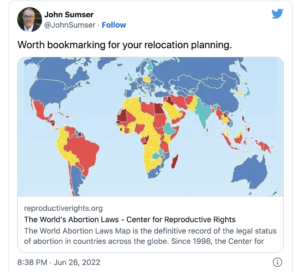Fifty years of abortion rights ended on Friday when the Supreme Court overturned Roe v. Wade in a 6-3 decision. Many women and women’s rights supporters have taken to social media and in-person protests in outrage of the decision, which could potentially lead to the Supreme Court next overturning same-sex marriage and access to contraceptives.
As reported by USA Today in May when the draft opinion to overturn Roe v. Wade was leaked, health experts and policy experts have said people of color and other people from marginalized, low-income communities will be the most affected by abortion bans and restrictions.
According to data from the Pew Research Center, more than half (56%) of the Black population in the U.S. lives in southern states, where women of color, including Hispanic women, make up a significant proportion of that number.
Southern states where abortion bans have gone into effect include:
- Alabama
- Louisiana
- Oklahoma
- Texas
Other southern states such as Florida and Georgia do not have bans in effect yet but plan to do so.
Fatima Goss Graves, an attorney and president of the National Women’s Law Center, told USA Today that overturning Roe v. Wade will affect rural areas, women of color and those women with low income because they all already have “barriers to healthcare, even before an abortion ban.”
With the overturning of Roe v. Wade, women will have to travel to states where abortions are still allowed. Young women and women with low incomes, who are disproportionately women of color, might not be able to afford the cost of travel to have an abortion.
“This will be a giant hurdle placed in front of them,” Graves said. “Most people who seek abortion care already have children.” She added that these people who already have children and seek abortion care might not have the ability to leave their home to receive care because they might not have time off work or childcare.
Employer Assistance
While overturning Roe v. Wade has created significant barriers to abortion access, some employers have already stepped up to offer help to employees who need to get an abortion.
Lauren Hobart, President and CEO of Dick’s Sport Goods, announced on LinkedIn that the company will reimburse up to $4,000 in travel reimbursement for employees to travel to the nearest state where abortion care is legally available if they live in a state where access to abortion is restricted.
CNBC reported in May that Salesforce told its employees in a Slack message that it would help them relocate if they are worried about having restricted access to abortions. In the post, Salesforce President and Chief People Officer Brent Hyder wrote: “If you have concerns about access to critical health care in your state, Salesforce will provide financial support for travel, available through our healthcare providers, and/or help relocate you and members of your immediate family.”
Other companies that plan to cover travel costs for employees who need an abortion include (just to name a few):
- Accenture (ranked No. 1 on Fair360, formerly DiversityInc’s 2022 Top 50 Companies for Diversity list)
- Apple
- Alaska Airlines
- Bumble
- Comcast NBCUniversal (ranked No. 7 on Fair360, formerly DiversityInc’s 2022 Top 50 Companies for Diversity list)
- Disney
- Kroger
- Meta
- Microsoft
- Netflix
- Nike
- Uber
- Yelp
Americans Consider Relocating
Some Americans are also considering relocating to states that still allow abortions and some companies are supporting this. As mentioned, Salesforce is one of those companies. Google is another that will allow employees to move to states with abortion rights. While the company hasn’t released an official statement, Susan Wojcicki, CEO of YouTube, which is owned by Google, said every woman should have a choice.
Read Wojcicki’s Tweet and other Tweets around abortion restrictions below.





















